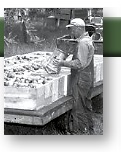Washington Apple Country History
History of Wenatchee - part 2
The first substantive farming pursuit in Wenatchee was undertaken some ten- to fifteen years before even the most modest irrigation ditches were built by the pioneering homesteaders who began to populate the area between 1880 and 1900. Apple growing was not initiated by those who migrated westward during the gold rush, but by a single enterprising and adventurous immigrant who had come to the eastern shores of this country from Europe.
Born in Germany in 1835, Philip Miller was still in his teens when he emigrated, with his parents, to the United States in 1854.
The family settled in Pennsylvania, but young Miller soon developed an unquenchable wanderlust and headed westward. For a brief time he took up residence in Minnesota, where he plied his trade as a carpenter. Those skills served well enough to enable Miller to secure employment wherever he went; thus, the years preceeding the Civil War found the young German immigrant roaming again, this time toward the South.
Miller had taken up temporary residence in Missouri when, on the night of 12 April, 1861, the Confederates began the bombardment of Fort Sumter. By the time the acrid smoke had cleared over the port city of Charleston, South Carolina, Miller had enlisted to serve the Union in Company C, Third Regiment of the Home Guards from his newly adopted state. During the next four years as an active janissary, he is recorded to have distinguished himself at two of the principal engagements which would buttress the tenacious troops under General Ulysses Grant: Fort Donelson and Shiloh. Successfully mustered out in 1864, Miller set forth with renewed wanderlust into the unchartered northwestern territories. Arriving in Montana in 1865, he practiced his carpentry vocation and began to prospect for minerals. During that first year, Miller had remarkable mining success at a place called Confederate Gulch. He panned out five thousand dollars in that single year alone--a veritable fortune for those times. This proved enough incentive for him to remain in Montana for nearly seven years, before the desire for adventure evinced itself once more.
Miller continued west almost as far as he could travel, this time relocating to Ellensburg, Washington. For a couple of years he tried his hand at raising livestock before purchasing the claim of an earlier settler to a very large section of land in the Wenatchee Valley. There may have been more than two hundred acres in that intial claim. He also obtained the water right to nearby Squilchuck Creek, and completed an irrigation ditch which still bears his name. Employing the tactic of "squatter's rights," Miller eventually succeeded in more than doubling his land holdings over the course of the next fifteen years.
After having secured his claim in Wenatchee, Miller set about building a large enough homestead where he could continue to breed livestock. He planted crops of alfafa and hay on the initial acreage, along with one other, experimental, yield: the rooted seedlings of apple trees which he had brought up from Ellensburg. The saplings acclimated well to the semi-arid habitat and to the lava-rich soil on the valley floor. Miller's apple trees matured so steadily as to demonstrate the potential for a new and lucrative business.
back to first page
|





